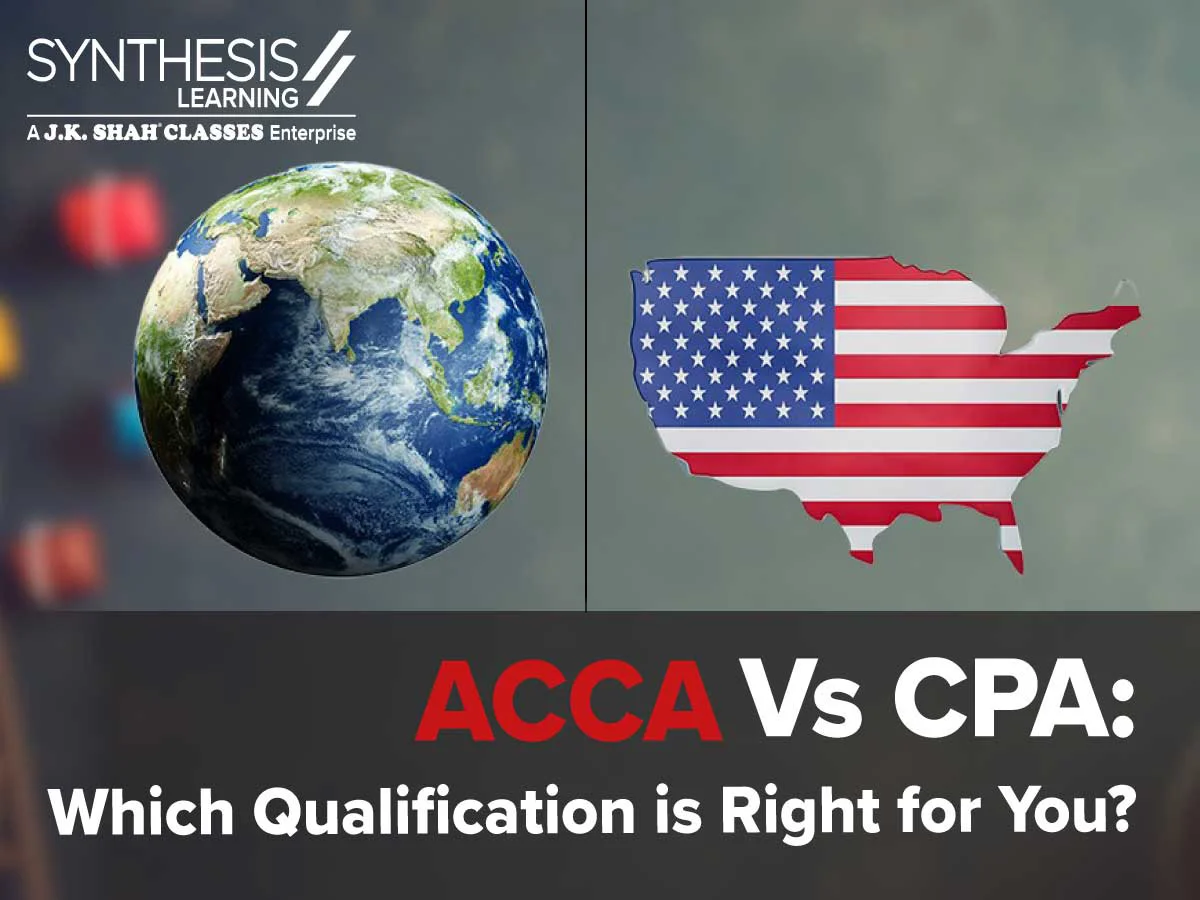ACCA vs CPA :
Aspiring students often need help deciding which qualifications to pursue to advance their careers in the dynamic financial and accounting sectors.
Both the Certified Public Accountant (CPA) and the Association of Chartered Certified Accountants (ACCA) are highly respected qualifications in the financial world, opening doors to exciting career opportunities. However, they cater to different career aspirations and geographical priorities. Choosing between them can be a significant decision, so let’s delve into their key differences:
Also, check out our video on ACCA vs CFA:
Overview
ACCA
ACCA is a professional qualification focusing on accounting, finance, and business management. The Association of Chartered Certified Accountants is a UK-based professional body headquartered in London. ACCA is recognised globally, having 247,000 members and 526,000 students in more than 181 countries.
CPA (US)
The American Institute of Certified Public Accountants (AICPA), the world’s largest accounting body, offers the Certified Public Accountant (CPA) qualification. CPA is rooted in the United States.
This robust community of professionals provides a vast network of support, mentorship, and career opportunities. US CPA is a great way to build a career in accounting and finance.
Job Roles: Unveiling the Destinations
ACCA
ACCA’s broad curriculum opens doors to many roles across accounting, finance, and business. You could work in
- Accounting
- Financial Planning & Analysis
- Internal & Statutory Auditing
- International Tax
- Advisory
- Management Consulting
- Risk
- Investment Banking
- Corporate Finance
- ESG Consulting and many more.
The versatility of ACCA empowers you to explore diverse paths, choosing the one that resonates with your unique strengths and interests. The average salary for a fresher ACCA professional is 6 to 7 lacs.

CPA
CPAs work primarily within the US financial ecosystem. You could work as –
- Public Accountant
- Forensic Accountant
- Financial Analyst
- Internal Auditor
- Investment Banker
- Tax Consultant
- Management Consultant and many more.
- US American back office
In India, the average salary of a CPA is Rs 8 to 10 lacs.

Eligibility
ACCA
ACCA offers flexible entry points –
- After Grade 10/ 12: Start your journey early with foundation-level courses.
- Graduation (B.Com/M.Com): Build upon your existing knowledge with exemptions based on your degree.
- CA Inter/Final: Leverage your CA studies for even more exemptions (up to 9 Exemptions)
- After CMA: Up to 9 Exemptions
Completing the ACCA exams typically takes 18-24 months, depending on your study pace and prior qualifications.
CPA
While CPA exam prerequisites differ in specifics across the United States, the core requirements remain consistent. To become a certified public accountant, you’ll generally need:
Exam Eligibility:
- Minimum 120 credits.
- One year of Indian university education typically grants 30 credits.
- Compulsory Graduation.
License Eligibility:
- Minimum 150 credits.
- Two years of relevant work experience under a licensed CPA.
As mentioned, the minimum credit requirement for the US CPA exam is 120. Unfortunately, a typical Indian bachelor’s degree only grants 30 credits per year, translating to 90 credits upon graduation due to the three-year program structure, a difference from the four-year US system. This leaves a 30-credit gap that needs to be bridged for eligibility.
To fill this gap, you have two options:
- Pursue a postgraduate degree
- Complete a bridge course
Completing the CPA exams typically takes 18 – 20 months.
Subjects & Syllabus
ACCA Subjects
Knowledge Level
- Business and Technology (BT)
- Management Accounting (MA)
- Financial Accounting (FA)
Skill Level
- Corporate and Business Law (LW)
- Performance Management (PM)
- Taxation (TX)
- Financial Reporting (FR)
- Audit and Assurance (AA)
- Financial Management (FM)
Professional Level
Essential Papers
- Strategic Business Leader (SBL)
- Strategic Business Reporting (SBR)
Optional Papers (any 2)
- Advanced Financial Management (AFM)
- Advanced Performance Management (APM)
- Advanced Taxation (ATX)
- Advanced Audit and Assurance (AAA)
All Exams are computer-based
CPA Subjects
The CPA exam is changing in 2024. From 2024, the exam will follow a “Core-Plus Discipline Model,” where you will be tested in three core sections and will be able to choose one of the three primary disciplines you want to be tested on.
The Core sections are:
- Financial Accounting and Reporting (FAR)
- Auditing and Attestation (AUD)
- Taxation and Regulation (REG)
The 3 primary disciplines are (choose any 1):
Group 1:
- Business Analysis and Reporting (BAR)
- Information Systems and Controls (ISC)
- Tax Compliance and Planning (TCP)
Each is a 4-hour computer-based exam
Exam Structure
ACCA
The exams are computer-based and consist of 13 exams (Fewer papers in case you are eligible for exemptions) divided into three levels (as explained above).
Each level offers flexibility, allowing you to progress at your own pace and conquer sections individually. ACCA exam happens 4 times a year:
- March
- June
- September
- December
CPA
You need to clear 4 exams. Each is a 4-hour computer-based exam. CPA exam happens throughout the year :
- Jan
- Feb
- Apr
- May
- Jul
- Aug
- Oct
- Nov
Passing Rates
ACCA
Overall: The average pass rate for ACCA exams typically ranges from 40% to 50%, depending on the specific paper and level.
Breakdown by level:
- Knowledge level: 70-75% pass rate
- Skills level: 40-50% pass rate
- Professional level: 40-50% pass rate
CPA
Overall passing rates hover around 50%.to 55%
Cost
Investing in a professional qualification like ACCA or CPA requires a significant financial commitment due to various associated costs. These include registration and subscription fees, exam fees, study materials, and optional tuition and coaching fees.
ACCA
The estimated cost for pursuing ACCA, including all potential expenses, typically ranges from INR 3.5 to 4 lacs.
CPA
The cost of pursuing a CPA can vary between INR 3.5 to 4 lacs.
ACCA vs CPA: The Right Choice for You?
It comes down to two choices:
Why ACCA –
ACCA stands for Association of Chartered Certified Accountants, and it’s a superpower for finance in many countries. Here’s why it’s awesome for Indian students:
- Globally recognized: ACCA opens job opportunities in all major finance capitals worldwide. India, the UK, Dubai, Singapore, etc, are bustling with job opportunities for ACCA candidates.
- Flexible learning: The ACCA qualification offers immense flexibility. Start after grade 10 /12 /alongside graduation/post graduation / CA Inter / CA Final, and pursue it concurrently with your graduation studies. This efficient approach allows you to graduate at 21 with the dual advantage of a bachelor’s degree and a globally recognized qualification, opening doors to exciting career opportunities.
- Transform your financial acumen: Dive deep into accounting, finance, tax, and business strategy, acquiring the knowledge and skills to navigate the financial landscape with ease. No more feeling lost or intimidated! This comprehensive mastery will empower you to make informed decisions, seize opportunities, and confidently tackle any financial challenge.
- Let your resume roar: Don’t just blend in; stand out! The ACCA qualification emblazoned on your resume sends a powerful message. Employers recognize it as a mark of excellence, opening doors to higher salaries, better job offers, and a faster promotion track. So, invest in your future, invest in ACCA.
Why US CPA –
CPA is one of the most respected and sought-after qualifications in the accounting profession. A CPA qualification opens numerous career opportunities, from public accounting firms to corporate finance positions with a US base. Here’s why you should choose CPA:
- Secure employment in the US: Renowned American companies actively seek CPA professionals.
- Work for American companies in India: Gain a competitive advantage within American companies operating in India, accelerating your career advancement and earning potential.
- Accelerate career growth: Gain access to high-demand positions and competitive compensation packages.
Conclusion
Choosing the right qualification is a strategic decision. Analyze your goals, assess your resources, and leverage this comparison to confidently chart your course to success in the exciting world of business & finance. Remember, ACCA and CPA offer distinct advantages, and the ultimate choice lies in aligning your qualifications with your personal and professional aspirations.
Also read our blog on ACCA vs MBA, ACCA vs CFA & ACCA vs CA



